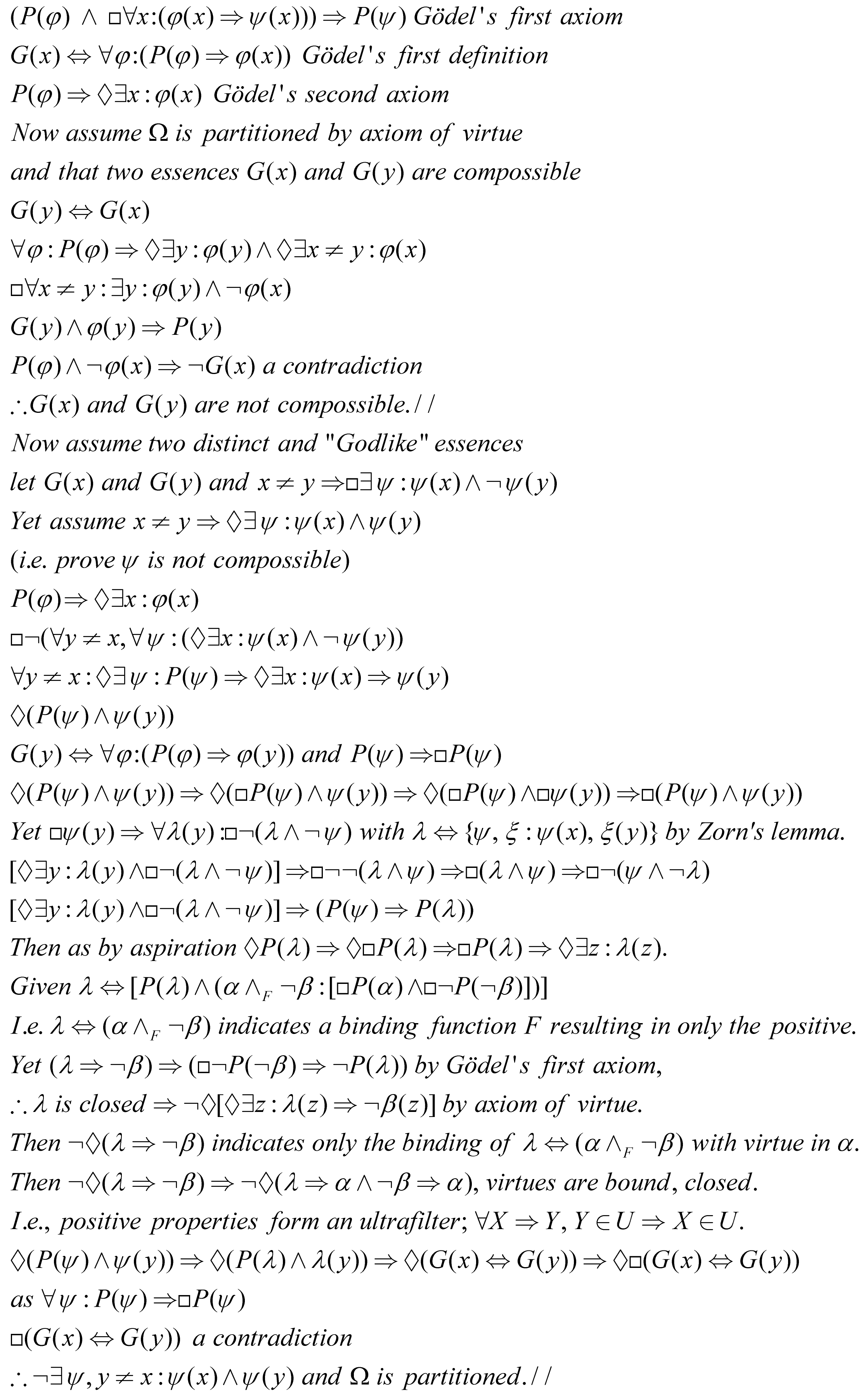 Ω Is Partitioned
I include the following "proof" for the fact that Gödel's axioms permit the set of all positive properties to be partitioned into separate ultrafilters.

A Simple Corollary:
The proof above holds
for any property λ shared between Godlike sets that have supersets possibly reached by aspiration. If such a predicate is closed to aspiration; there can be no self-difference (empty or otherwise), and the set is certainly closed. Any property compossible with two Godlike sets (otherwise disjoint) must be "closed to aspiration" and without self-difference.
Summary:
If Scott's axioms are to hold, then the side not extant in every disjunction has an empty essence; the essence that side has instead adjoined itself to virtue on the other side chosen extant, to produce the principal element of the result of that binding. (By axiom of virtue).
If Gödel's axioms hold, then the empty essence may also apply across any disjunction in virtue to an incompossible set or ultrafilter. That set is an ultrafilter closed with its own essence of N.E., and the empty essence is then only free to apply across the disjunction (but then impossibly so in the middle as on both sides) if it is then assumed that only the principal element was present the side not extant: then that essence certainly is as N.E., despite there (possibly) being no modal collapse (from Scott's conjunct). If there is a non-trivial set on that side not extant then it is incompossible with that on the other by the above: The empty essence in the middle, then, is the statement that if the disjunction is formed as between the individual x and y, then y, if empty of essence, is equal to the individual x, in that the essence of y entails the N.E. of x. Then these two ultrafilters, with that inconsistency of the middle of y = x , entails no other inconsistency, for the empty essence across the disjunction is not extant, only the essence of the separate individual x which is necessarily extant (as if already chosen extant) with a predicate of N.E., a variable then never bound by the essence of y without contradiction in the middle. (For the essence of any such x remains principal.)
If the essence of x in kind (which is then supposed empty) would entail the N.E. of y (when y is extant), then again, the principal element otherwise in x has adjoined with virtue to entail that of y, which as an essence is clearly also equivalent to N.E.
I hope to show that if at most one set in the Godhead has an empty essence (as in the composite individual), God in Trinity is the "minimal" such composite individual wholly without an empty essence by the axiom of virtue.
The model of GF(8) certainly does fit (there is no empty essence both sides in any disjunction), the axiom of virtue then requires that the empty essence (if present) not be compossible with any other ultrafilter in the octal. As the middle as above carries the statement that x = y across the disjunction, equal to the empty essence itself, it is not a compossible essential property as there is then an inconsistency. There is no empty ultrafilter; virtuous choice being already extant, there is no possible and "empty" world ever to be found.
Besides Gödel's axioms permitting a partition of Ω into separate incompossible ultrafilters, there is little else to claim. I only restate that Gödel's definition of a positive predicate and of the Godlike predicate permit just that.
Continue To Next Page
Return To Section Start
Return To Previous Page |